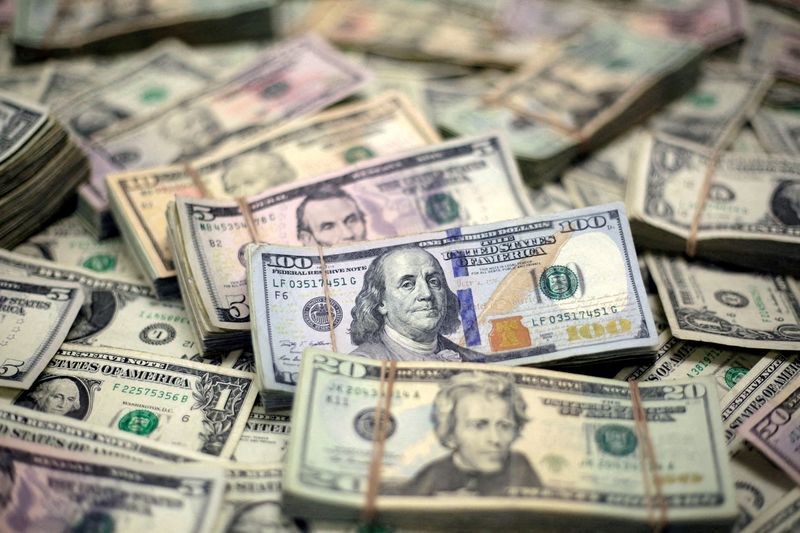By Laura Matthews
NEW YORK (Reuters) -The dollar softened against other major currencies on Wednesday, after stronger-than-expected U.S. data and a UK budget release set off choppy trading in a market awaiting jobs data later this week and a U.S. election the next.
U.S. private payrolls growth surged in October, overcoming fears of temporary disruptions from hurricanes and strikes, according to the ADP National Employment Report.
Meanwhile, separate data showed the U.S. economy grew at an annualised rate of 2.8% in the third quarter, slightly lower than the 3% expected by economists.
The U.S. dollar index, which measures the currency against six major rivals, rose to 104.43 earlier in the session but was last seen down 0.17% to 104.06. It rose to the highest since July 30 at 104.63 on Tuesday.
"Besides sterling, I think today is about position adjusting ahead of the data on Friday," said Marc Chandler, chief market strategist at Bannockburn Global Forex. "The two big uncertainties are the U.S. jobs data on Friday and the U.S. election."
Mixed U.S. indicators overnight, showing a loosening U.S. jobs market but a confident consumer, provided little clarity on the outlook for Federal Reserve rates, allowing the greenback to drift lower with Treasury yields.
Recently though, economic readings have pointed to a resilient jobs market and economy, spurring traders to pare back their bets on rate cuts.
Uto Shinohara, senior investment strategist at Mesirow Currency Management in Chicago, said markets have priced in a 25-basis-point cut for November's Fed meeting, but that another cut in December remains a coin flip.
"With the focus more on employment data, a strong non-farm payroll print would provide Fed ammunition for a December pause," said Shinohara. "Although the election result can have a major consequence on rates over the next presidential term, the effect in the short-term will be dependent upon employment and growth."
Both the dollar and U.S. bond yields have also been buoyed in recent days by rising speculation in markets and on some betting platforms of a victory in the Nov. 5 presidential election for Republican candidate Donald Trump - whose tariff and immigration policies are seen as inflationary - and who is standing against Democrat Kamala Harris.
That helped leading cryptocurrency bitcoin surge to near its all-time high from March at $73,803.25, as Trump has vowed to make the United States "the crypto capital of the planet".
The token last changed hands at about $71,959, after pushing as high as $73,609.88 in the previous session.
UK BUDGET
Sterling, which fell as much as 0.6% as British finance minister Rachel Reeves delivered the Labour government's first budget, was last down 0.34% at $1.2971.
Gilt yields initially fell during Reeves' budget but then rose later in the session, with the 10-year UK government bond yield rising 6 basis points to hit 4.39%, its highest since late May.
Reeves, along with Prime Minister Keir Starmer, has reiterated the need for tough fiscal measures to help improve Britain's public finances.
They are seeking to retain the confidence of investors, two years after then-prime minister Liz Truss' tax-cutting plans sparked a crisis in the bond market.
"I think generally, the expectations were fairly low for the budget, and they delivered a fairly reasonable budget," said Amo Sahota, director at Klarity FX, San Francisco. "Sterling has managed to avoid a major slip up here, and actually it has been a bit more supportive of the pound than I thought."
The euro was last up 0.36% at $1.0857, while the dollar was flat at 153.42 yen.
German growth and regional inflation data came in stronger than expected causing traders to trim their bets on an outsized rate cut from the European Central Bank in December.

The euro zone economy also grew 0.4% in the third quarter, more than the 0.2% expected by economists.
The Aussie dollar, which dropped as low as $0.6537 for the first time since Aug. 8, after data showed inflation slowed to a 3-1/2-year low, was up 0.26% at $0.6577.